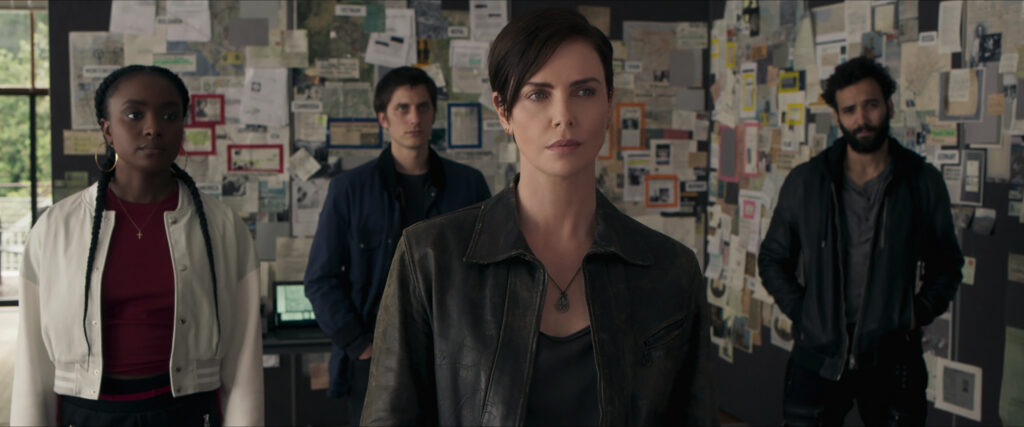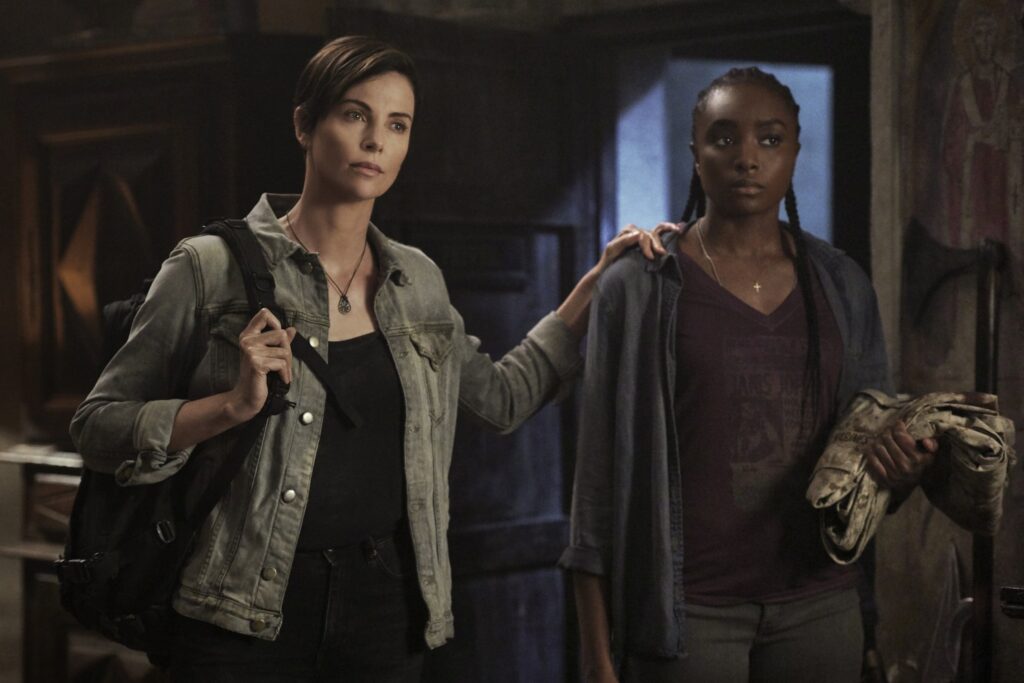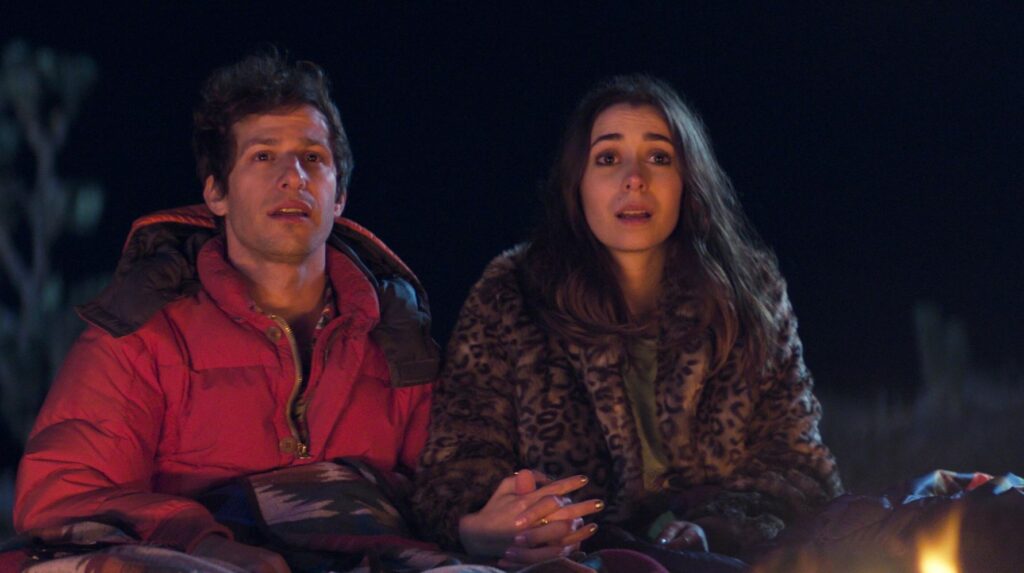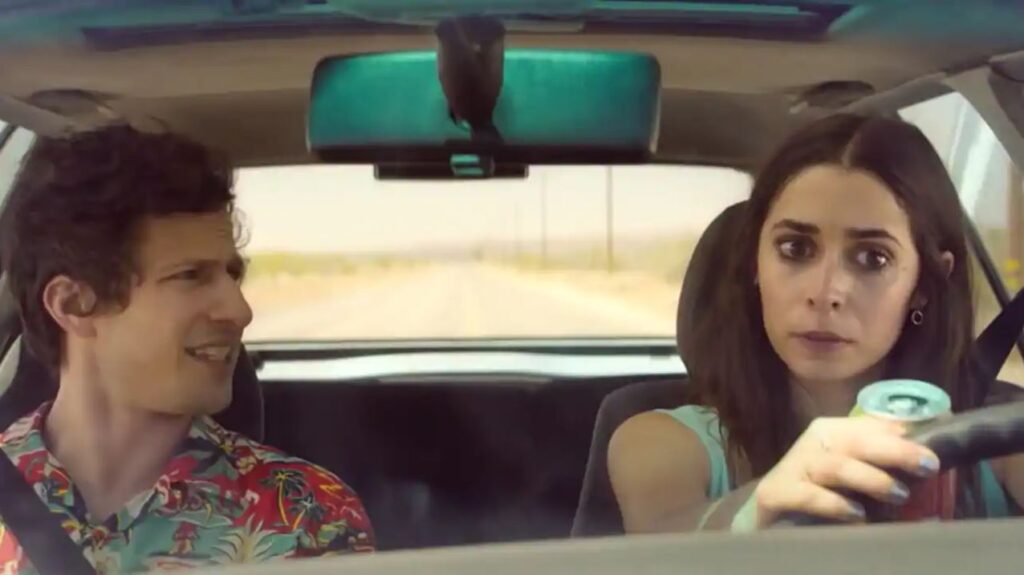
Who wants movie characters to live forever? Plenty of people, apparently, given how many films are made about the undead or the undying. This makes some sense: Reality has yet to discover the fountain of youth, so art has stepped in to fill the gap, allowing us to grapple with the dream (or the nightmare) of life everlasting. But it also presents a unique challenge for storytellers. No picture can fully encapsulate a person’s entire life (not even Boyhood), yet we still expect a certain degree of finality when the credits start to roll. How can movies deliver that necessary closure when their characters’ lives are open-ended?
Last month, two very different films wrestled with this quandary, in decidedly different ways. In The Old Guard, Charlize Theron plays the leader of a band of immortal mercenaries struggling to find meaning in a life of perpetual assassination. And in Palm Springs, Andy Samberg and Cristin Milioti star as wedding guests locked in an infinite time loop, doomed to relive the same sunny Southern California day over and over. Both movies attempt to interrogate their characters’ predicaments, but only one does so with any real freshness. The Old Guard may be a sturdy and accomplished piece of action filmmaking, but it never truly distinguishes itself from the pictures it’s imitating. Palm Springs, on the other hand, improbably manages to evade the giant shadow cast by Groundhog Day, transforming into a romantic comedy that tickles your brain as well as your funny bone.
Let’s start with The Old Guard. I hesitate to diminish its achievements, as it does a number of things quite well. Directed with strength and snap by Gina Prince-Bythewood (Beyond the Lights), it exhibits a natural feel for combat, with fight sequences that are flashy and kinetic without being overly jumpy. It also possesses a certain grit, largely thanks to Theron, who continues—following Mad Max: Fury Road and Atomic Blonde—to cement herself as one of contemporary cinema’s most reliable action heroes. Watching her character, Andy, slice through hapless enemies while wielding an impossibly cool, double-bladed battle axe is a bit like watching LeBron James knife into the paint: half-graceful, half-brutal, every inch a star.

Theron’s charisma is the most appetizing ingredient in The Old Guard, which serves up a gloppy stew of classical mythology, geopolitical chicanery, and entrepreneurial venality. The screenplay, by Greg Rucka (based on his comic book), conceives of Andy and her three comrades—played by Marwan Kenzari, Luca Marinelli, and the always-welcome Matthias Schoenaerts—as disenchanted paramilitary operatives, wearily making the world a safer place. As the title implies, they’ve been doing this awhile—in the ultimate meet-cute, Kenzari and Marinelli’s characters became lovers after they killed each other in the Crusades—and their enthusiasm for civilization-saving is slowly being replaced by ennui.
What would it feel like, being an invincible warrior and eternally racking up a limitless body count? The Old Guard feints toward that knotty question, but it doesn’t unravel it with any real inquisitive vigor. Sure, there’s some blunt dialogue about how Andy and her compatriots have been laboring for a very long time, and Theron’s pensive stares—along with the score’s somber compositions—are designed to communicate the weight of their collective existential pickle. But there isn’t much to say, not when Andy is too busy delivering patient exposition to Nile (KiKi Layne, from If Beale Street Could Talk), a no-nonsense soldier who early on takes a bullet to the head, only to find that life—or death—has other plans for her.

In fact, the more intriguing question ends up being whether Prince-Bythewood can invest her set pieces with any suspense, given that her combatants are invulnerable. This is a problem that has plagued superhero movies for decades, and The Old Guard solves it with a maneuver that’s both disappointing and kind of brilliant: It cheats. Specifically, midway through the film, Andy realizes that she no longer possesses the Wolverinian power to heal herself, meaning she’s suddenly in real peril.
It’s a clever move, because it allows Prince-Bythewood to orchestrate fight scenes that carry genuine stakes. Yet it also illustrates that the movie’s heart lies with its body rather than its mind—that the physical trumps the metaphysical. That’s fine; we hardly needed another ponderous superhero flick straining for profundity. Still, it makes The Old Guard less memorable than it might have been. It’s an entertaining enough picture, but its aftertaste is somewhat bitter, given that it gestures toward complex ideas without following through on them.
The denouement of The Old Guard sets up a sequel, which feels inevitable for reasons beyond the usual blockbuster imperatives. After all, if movie characters’ lives are unending, why should movies themselves be any different? Perhaps Prince-Bythewood can explore that and other questions next time around, and maybe in the process spice up her skillful displays of savagery with some actual thematic risk.

The issue of risk is baked into the very DNA of Palm Springs, because any time-loop story will immediately be met with one inescapable question: Why aren’t you Groundhog Day? Harold Ramis’ 1993 classic both created an entirely new subgenre and instantly diminished its potential; the Bill Murray vehicle is so marvelously inventive and stimulating, it makes its many imitators feel inferior by comparison. Palm Springs isn’t quite a great movie—it occasionally falters on both sides of the rom-com equation, and its final scene feels a little easy—but it’s smart and spry enough to justify its own existence independent from Groundhog Day, and that’s no small feat.
It pulls this off not by reinventing Ramis’ formula but by shrewdly modifying it, like a veteran scholar adapting a cherished text. Its first key tweak comes early: Nyles, played by Samberg with a sly mixture of aw-shucks charm and veiled desperation, opens the film already trapped within the loop, having relived the same banal nuptials countless times. (He’s sorta-dating a bridesmaid, which generates a droll asymmetry: Most of the attendees barely even know who he is, whereas he’s practically memorized everyone’s social security number.) Not only does this save screenwriter Andy Siara the bother of tedious setup—when your audience is already familiar with the concept, the simple line of “It’s one of those infinite time-loop things” is all you need—but it also places Nyles in appealing counterpoint with Sarah (Milioti, fantastic), the bride’s sister, whom he inadvertently pulls into the recurring vortex. Where he’s world-weary and blithely accepting of his fate, she’s enraged and incredulous. What’s such a mismatched, eternally linked pair to do but fall in love?

Palm Springs’ broad strokes might be predictable, but its details are gratifyingly creative and surprising. It’s sharply attuned to its main characters, highlighting their intellectual compatibility—in addition to them both being smart and funny, Nyles and Sarah share an acerbic cynicism—alongside their temperamental disparity. The closeness that they gradually develop isn’t entirely rooted in literal proximity; it also stems from a legitimate attraction that cautiously, persistently blooms.
Then again: What else do they have to do? Unlike The Old Guard, which treats its heroes’ immortality as a plot point more than anything else, Palm Springs digs deep into the thorny implications of its premise, asking questions both philosophical and ethical. How should you live when you keep reliving the same day? Is the prospect of a consequence-free existence exhilarating or enervating? Is personal connection the keystone to happiness, or do other people always let us down eventually? And just what would it feel like if life constantly went on yet never went anywhere?
Palm Springs isn’t a seminar; it doesn’t get too entangled in these issues to the point of stuffiness. (A keen example of its wry approach: When Sarah asks him if he’s ever considered a certain possibility, Nyles deadpans, “Yeah, no, I’ve never thought about the multiverse.”) But it exhibits more than a passing interest in moral dilemmas without ever letting its curiosity detract from its narrative momentum. In fact, around its halfway point, it deploys a pair of ingeniously concealed twists that complicate its main relationship, weaponizing its theme of repetition and forcing us to reconsider Nyles and Sarah’s relationship anew. And though the film’s last shot falls flat, its resolution of its central conundrum—which draws on science rather than sap—represents another canny revision of Groundhog Day.

Palm Springs is so fascinating and thought-provoking—the kind of movie you find yourself thinking about weeks after watching it—that it’s disappointing it isn’t even better, as parts of it don’t quite work. Siara and the director, Max Barbakow (making his first feature), concoct a series of playful escapades—eccentric dance parties, wedding cosplay shenanigans—but the comedy quotient is uneven; a number of scenes are more witty than laugh-out-loud funny. Despite a wild turn from a characteristically excellent J.K. Simmons, the supporting characters lack depth. (This may be by design, given that a key facet of Nyles and Sarah’s crisis is that they’re the only people who can actually grow over time.) And while Samberg proves more than capable of articulating Nyles’ goofball disillusionment, he’s less successful with the lovestruck component; when it comes to delivering a Big Emotional Speech, he doesn’t possess the necessary gravitas.
But Milioti does. She’s been acting on TV for ages, but this is arguably the first time—perhaps excepting the “U.S.S. Callister” episode of Black Mirror—where she’s been afforded the opportunity to showcase her range. In a movie so full of life and wit, her Sarah is the picture’s most vivid creation, a brittle and guarded woman who nevertheless churns with passion, intelligence, and resolve. Palm Springs is a blast the first time through, but it’s Milioti’s adroit performance that will tempt you to revisit its lovely, loopy universe over and over again.
The Old Guard grade: B-
Palm Springs grade: B+
Jeremy Beck is the editor-in-chief of MovieManifesto. He watches more movies and television than he probably should.
